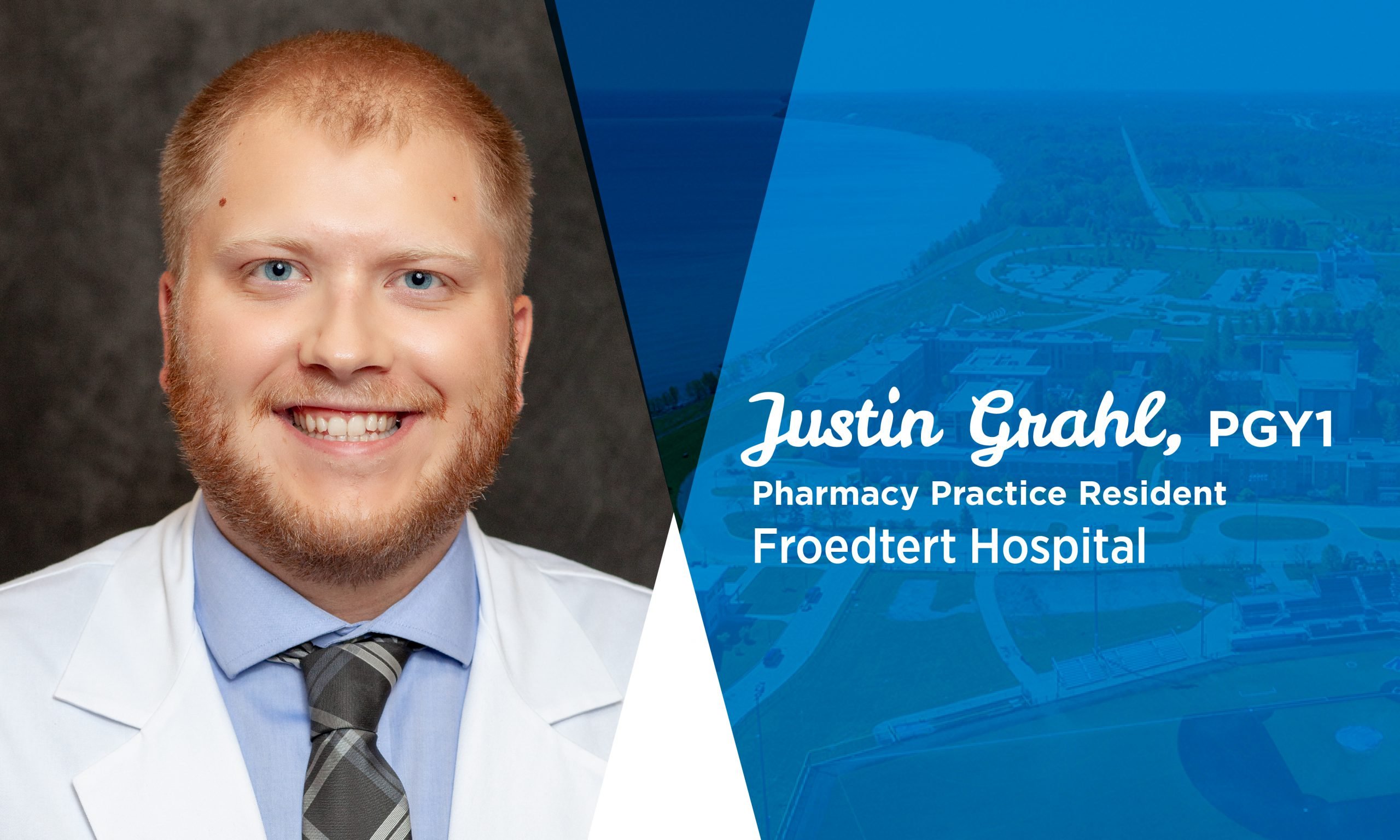
Concordia University Wisconsin School of Pharmacy alumnus Justin Grahl just received a grant from the ASHP.
PGY1 Justin Grahl receives ASHP research grant
Grahl is in his first year as a postgraduate resident at Froedert Hospital.
A pharmacy residency is an organized, directed, postgraduate training program in a defined area of pharmacy practice. A residency gives graduates the knowledge and experience to further their training with a clinical focus. During residency, a resident performs as a licensed practitioner but trains under the supervision of an experienced preceptor. As many as 42% of Concordia University Wisconsin’s School of Pharmacy graduates pursue either a residency or a fellowship.
We asked Grahl about his pharmacy residency and research. Check out his answers below!
What is your current role?
I’m a PGY1 Pharmacy Practice Resident, and I’ll be transitioning to PGY2 Oncology Practice Resident in June. My career goal is to be an ambulatory oncology pharmacist integrated into an oncology clinic, with interests in GI cancers and pharmacogenomics.
What is the ASHP? Tell us about the grant you received.
The ASHP stands for the American Society of Health-System Pharmacists. It’s a national pharmacist organization, and its goal is to be the collective voice of pharmacists who serve as patient care providers in hospitals, health systems, ambulatory clinics, and other healthcare settings spanning the full spectrum of medication use. The mission of the organization “is to help people achieve optimal health outcomes.” The ASHP is important to pharmacy residents, especially, because it’s their accrediting body.
I received a grant provided by the ASHP Foundation. The Pharmacy Resident Research Grant supports quality health service research focused on practice advancement conducted by residents in ASHP-accredited pharmacy residency programs or by residents in pharmacy residency programs that have submitted an application for ASHP accreditation.
What is your research topic?
My research topic is Pharmacogenetic Evaluation of Hospitalized Patients Requiring Naloxone Administration. The goal of this project is to provide a proof of concept for the application of pharmacogenetics in pain management and the integration of pharmacists in the evaluation of genetic polymorphisms in pain management patients.
The project will assess hospitalized patients that require the administration of naloxone due to opioid-related adverse effects following opioid administration. Patients presenting to the emergency department due to opioid overdose or any other purposeful overdose will be excluded. We will evaluate the relationship between genetic polymorphisms and naloxone administration by determining the number of patients within the selected patient population with opioid-related pharmacogenetic polymorphisms that place them at increased risk for opioid-related adverse events. The genetic polymorphisms found will then be described to allow for further application to pain management services within Froedtert & the Medical College of Wisconsin (F&MCW).
Why is this topic important to you?
This project is important to me because I believe that pharmacogenomics is the future of medicine. Pharmacists are uniquely trained to lead clinical implementation in this specific field of study. Also, I will be going into the field of oncology that already utilizes genetic testing to further classify and identify targets for treatment. Oncology will be an excellent area to further drive implementation of pharmacogenomics to guide drug selection and dosing of supportive care medications and other chronic disease therapies.
How do you plan to use the ASHP grant money for your research?
I’ll use the grant money to fund the custom genotype panel testing that is necessary to determine the genotypes of 13 specific genes that effect opioid metabolism.
Did you become interested in this topic in your time at Concordia University Wisconsin’s School of Pharmacy? If so, how?
I became interested in pharmacogenomics while at CUW’s School of Pharmacy. This is where it was first introduced in some of my earlier classes. I continued to explore the field by taking the third year elective conducted by Dr. Ray and Dr. Pickart.
I also conducted research with Dr. Pickart throughout my third year at CUW’s School of Pharmacy. We focused on the genetic mutations responsible for albinism and strategies for the treatment and prevention of cancer in this population. During my fourth year of pharmacy school, I also completed a Graduate Certificate in Precision Medicine from the University of Florida College of Pharmacy to further my training in the field.
How did you get involved with or become a member of ASHP?
I joined the ASHP while at Concordia School of Pharmacy as part of the student chapter. After obtaining a PGY1 Pharmacy Practice, I became more involved as an ASHP member. (It’s a requirement for pharmacy residents in an ASHP-accredited residency.) We discovered the ASHP grant from fellow project team members. We began to pursue the grant to provide funding for my PGY1 resident project.
What advice do you have for future pharmacists interested in your topic or area of pharmacy?
If you’re interested in pharmacogenomics, dive into any available research or classes available through your school of pharmacy. Also, I would recommend going above and beyond to pursue further outside training. Many universities and professional pharmacy organizations offer certificates and advanced training in pharmacogenomics and precision medicine. Finally, when you reach residency or your first job, always explore opportunities within your organization. This will help you implement new research projects and clinical services.
Do you want to know more?
Concordia’s School of Pharmacy educates future pharmacists and professionals to be servant leaders. If you’re interested in learning more about Concordia University Wisconsin’s School of Pharmacy, visit us here.
—
If this story has inspired you, why not explore how you can help further Concordia's mission through giving.